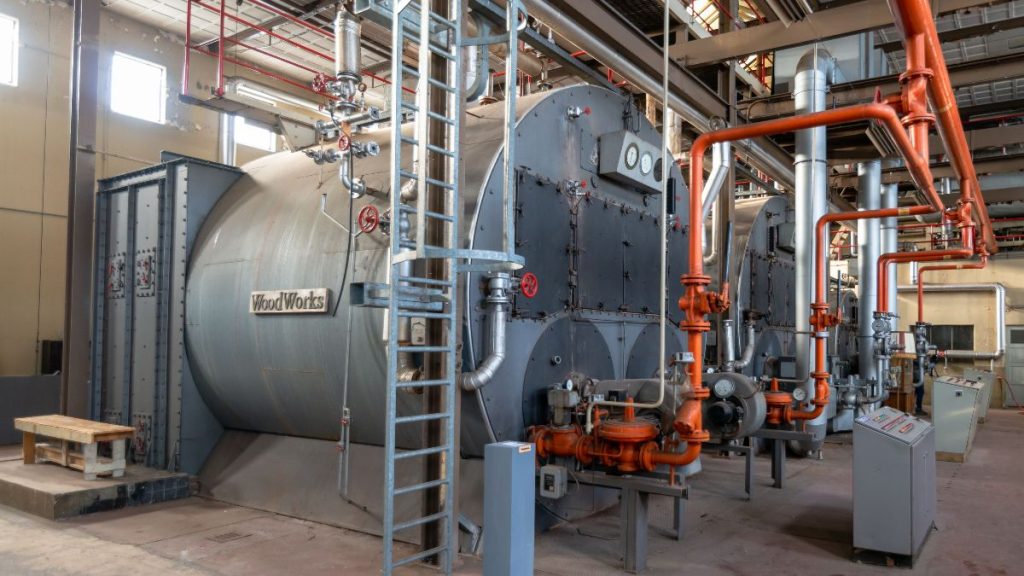Silica scaling is one of the most common and challenging problems in boiler systems across various industries. This phenomenon occurs when dissolved silica in feed water precipitates and forms hard, glass-like deposits on boiler tubes and heat exchange surfaces. Over time, these scales reduce heat transfer efficiency, increase fuel consumption, and can even lead to severe equipment damage.
Silica Source in Boiler
Silica (SiO₂) is a naturally occurring compound found in most water sources, particularly groundwater and surface water. Its concentration depends on geological conditions and the type of rocks the water passes through. Silica is typically present in three main forms:
- Reactive silica – soluble and can pass through conventional filters, making it the most common contributor to scaling.
- Colloidal silica – tiny, suspended particles that are difficult to remove using standard filtration methods.
- Particulate silica – insoluble silica particles that can be removed through sedimentation or filtration.
When boiler feedwater contains high levels of reactive or colloidal silica, the risk of silica scaling increases significantly. As the temperature and pressure in the boiler rise, the solubility of silica decreases, leading to precipitation on metal surfaces. This precipitate forms a tough, glass-like layer that is extremely difficult to remove mechanically or chemically.
The main sources of silica entering the boiler system include:
1. Raw Water
Many industrial facilities use groundwater or river water, both of which may naturally contain silica due to rock dissolution. Without proper pretreatment, silica from these sources can enter the boiler feedwater.
2. Insufficient Demineralization
Inadequate performance of ion exchange or reverse osmosis (RO) units may allow silica leakage into the boiler system. Overloaded resin beds, exhausted membranes, or improper operation can reduce silica removal efficiency.
Read Also: Why Demineralized Water Still Contains Silica
3. Carryover from Steam Drum
If boiler water carryover occurs—caused by foaming or high total dissolved solids (TDS)—silica can enter the steam and deposit in superheaters, turbines, and other downstream equipment.
4. Improper Blowdown Control
Poor blowdown management can cause an accumulation of dissolved solids, including silica, in the boiler water. Over time, this concentration can exceed the solubility limit and promote scaling.
The presence of silica scaling poses significant challenges to boiler performance. Even a thin layer of silica can act as an insulating barrier, reducing heat transfer efficiency, increasing fuel consumption, and leading to overheating of metal surfaces. In severe cases, it may result in tube rupture or costly maintenance shutdowns.
Ways of Silica Scaling Prevention in Boiler
Preventing silica scaling involves a combination of proper water treatment, monitoring, and operational control. Below are several effective strategies to minimize or eliminate the risk of silica deposition in boilers:
1. Feedwater Pretreatment
Effective pretreatment is the first line of defense against silica scaling. The goal is to reduce silica levels before water enters the boiler. This can be achieved through:
- Coagulation and flocculation to remove colloidal silica.
- Clarification and filtration using media filters such as silica sand, anthracite, or activated carbon.
- Lime softening for partial removal of reactive silica.
In advanced systems, pretreatment may also include the use of reverse osmosis (RO) or ultrafiltration (UF) membranes, which can significantly reduce silica concentration to below scaling limits.
2. Demineralization Systems
Ion exchange systems play a crucial role in removing silica and other dissolved ions from feedwater.
- Strong base anion (SBA) resins are specifically designed to remove reactive silica by exchanging it with hydroxide ions.
- Regular regeneration and monitoring of resin capacity are essential to maintain silica removal efficiency.
When combined with cation exchange units, a mixed-bed demineralizer can produce high-purity water suitable for high-pressure boiler applications where silica control is critical.
3. Reverse Osmosis (RO)
RO systems are highly effective at reducing dissolved and colloidal silica. The semipermeable membrane acts as a physical barrier, allowing only pure water molecules to pass while rejecting contaminants.
Key operational practices include:
- Regular membrane cleaning and replacement.
- Proper pretreatment to prevent fouling.
- Maintaining optimal pressure and recovery rates to avoid silica breakthrough.
4. Chemical Treatment
Certain chemicals can be used to control silica scaling tendencies. These include:
- Anti-scalants that modify silica crystals, preventing them from adhering to metal surfaces.
- Dispersants that keep colloidal silica in suspension, reducing deposition risks.
- pH adjustment to maintain conditions that minimize silica polymerization and precipitation.
However, chemical treatment should always be optimized through professional analysis, as overdosing or incompatibility with other boiler chemicals may lead to adverse effects.
Read Also: How to Prevent Corrosion in Demineralization System?
5. Blowdown Control
Boiler blowdown is essential to manage the concentration of dissolved solids, including silica, in boiler water. By discharging a portion of the water periodically or continuously, the system maintains safe TDS and silica levels.
Best practices include:
- Implementing automatic blowdown control systems that monitor and adjust based on conductivity readings.
- Setting blowdown frequency according to boiler pressure, feedwater quality, and operational load.
Proper blowdown helps prevent silica buildup and ensures consistent boiler performance.
6. Monitoring and Regular Maintenance
Routine monitoring of silica concentration in feedwater, boiler water, and steam is critical. Advanced online analyzers can detect silica in trace levels, allowing early intervention before scaling occurs.
Maintenance should include:
- Periodic inspection and cleaning of boiler tubes.
- Regular calibration of sensors and analyzers.
- Review of water treatment efficiency and chemical dosing performance.
Preventive maintenance not only reduces the risk of silica scaling but also extends the operational life of the boiler system.
The Impact of Proper Silica Control
Maintaining proper silica control brings multiple operational and economic benefits:
- Improved heat transfer efficiency, reducing fuel consumption.
- Extended equipment life, minimizing tube damage and corrosion.
- Reduced downtime due to fewer maintenance requirements.
- Better steam quality, ensuring reliable performance of turbines and downstream systems.
- Compliance with industry standards, especially in power generation, food, and manufacturing industries where steam purity is critical.
By implementing a holistic water treatment and monitoring strategy, industries can safeguard their boiler systems against the costly effects of silica scaling.
Lautan Air Indonesia: Your Partner in Boiler Water Treatment
Silica scaling may seem inevitable, but with the right expertise and treatment technology, it can be effectively managed. This is where Lautan Air Indonesia plays a key role.
With more than 40 years of experience in water treatment, Lautan Air Indonesia provides comprehensive solutions to address silica-related challenges in boiler operations. Our offerings include:
- Advanced water treatment systems such as clarifiers, ultrafiltration, reverse osmosis, and demineralizers.
- High-performance boiler treatment chemicals, including scale inhibitors, dispersants, and anti-foaming agents.
- Operation and maintenance (O&M) services to ensure system reliability and consistent water quality.
- Laboratory testing and analysis for silica monitoring and chemical performance optimization.
- Tailored consulting and design services for new or existing boiler systems to improve efficiency and prevent scaling.
Our team of experts works closely with each client to design a customized treatment program that addresses specific operational needs and water characteristics. Whether it’s reducing silica load, optimizing blowdown, or improving feedwater quality, Lautan Air Indonesia delivers practical and reliable solutions.
Contact Lautan Air Indonesia today to learn how we can help prevent silica scaling and protect your investment.



